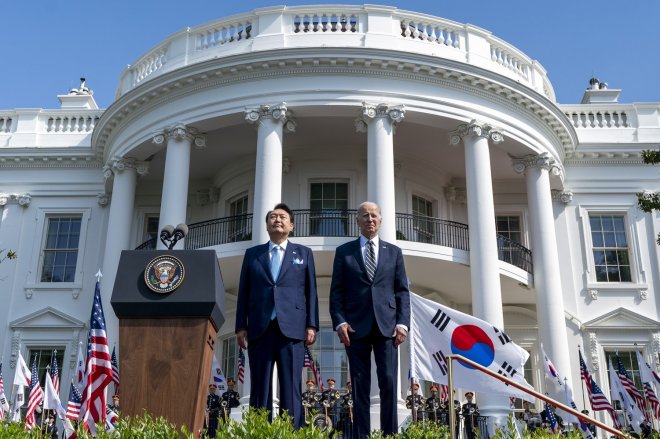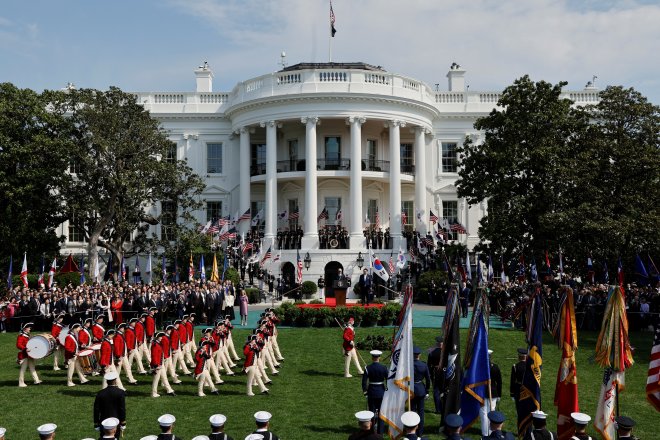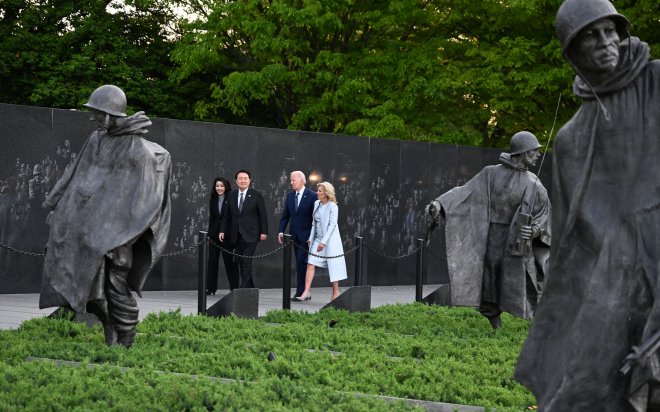
U.S. President Joe Biden warned North Korea on Wednesday that any nuclear attack on the United States or its allies would result in an end to the isolated regime while promising closer cooperation with South Korea on deterring the nuclear threat.
“Look, a nuclear attack by North Korea against the United States or its allies or partisans or partners is unacceptable and will result in the end of whatever regime [takes] such an action," Biden said during a press conference following a summit with South Korean President Yoon Suk Yeol, who arrived in Washington on Monday for a six-day official state visit.
During their meeting, the two leaders recognized the importance of the South Korea.-U.S. Alliance, now in its 70th year, which Biden called a “linchpin” of security in the Indo-Pacific region, and “an alliance of values based on [Seoul and Washington’s] shared universal values of freedom and democracy.”
“Our mutual defense treaty is ironclad, and that includes our commitment to extended deterrence, and — and that includes the nuclear threat and — the nuclear deterrent,” Biden said.
Yoon and Biden also signed the Washington Declaration, which acknowledged Seoul and Washington’s close relationship and commitment to strengthen mutual defense agreements.
The declaration said that Seoul had full confidence in U.S. deterrence commitments, and that Washington would make “every effort” to consult with South Korea on any “employment” of nuclear weapons on the Korean peninsula.
Through the declaration, the two sides also formed a new Nuclear Consultative Group, or NCG, which will “strengthen extended deterrence, discuss nuclear and strategic planning, and manage the threat to the nonproliferation regime posed by North Korea.”
The two presidents also restated that they are open to dialogue with North Korea without preconditions in order to achieve the complete denuclearization of the Korean Peninsula.
“Sustainable peace on the Korean Peninsula does not happen automatically,” said Yoon, through an interpreter, at the press conference. “Our two leaders have decided to significantly strengthen extended deterrence of our two countries against North Korea’s nuclear and missile threats so that we can achieve peace through the superiority of overwhelming forces and not a false peace based on the goodwill of the other side.”
‘Enhances credibility’
The NCG is an important contribution to strengthening the alliance, Gary Samore, the former White House Coordinator for Arms Control and Weapons of Mass Destruction, told RFA’s Korean Service.
“By greater consultation and simulation and exercises to deal with the North Korea nuclear threat … it shows that Seoul and Washington are not ignoring the changes that are taking place and recognize they have to do something to respond to it.” he said. “It enhances credibility, I think the most important element of credibility is the presence of US military forces.”
 U.S. President Joe Biden and South Korea"s President Yoon Suk Yeol watch as members of the U.S. military parade during an official White House State Arrival Ceremony on the South Lawn of the White House in Washington, U.S. April 26, 2023. Credit: Reuters
U.S. President Joe Biden and South Korea"s President Yoon Suk Yeol watch as members of the U.S. military parade during an official White House State Arrival Ceremony on the South Lawn of the White House in Washington, U.S. April 26, 2023. Credit: Reuters
Because the NCG gives South Korea more input on nuclear deterrence, it is a nuclear power sharing agreement short of sharing the weapons themselves, said Patrick Cronin, Asia-Pacific security chair at the Hudson Institute.
“At least Seoul will have a much better window into the U.S. thinking about potential responses to aggression. Deterrence is already strong but even the Kim regime will have to be a bit more cautious about even thinking about the use of force,” he said.
The NCG obliges Washington to consider Seoul’s views in nuclear decision making on multiple levels, said Michael O"Hanlon of the Brookings Institution.
“It may be even more key for alliance reassurance than for deterrence of North Korea and it reinforces the idea or truth that the two allies are co-equals,” he said.
Trade matters
Biden and Yoon also discussed trade issues during their talks, including what Biden characterized as “economic influence being leveraged in coercive ways.”
To that end, the two sides agreed to strengthen technological cooperation.
“So, that is about really strengthening the competitiveness of our two countries. And it will enhance productivity and create added value — high added value,” said Yoon. “These are the types of products that are going to be produced.”
 U.S. President Joe Biden, First Lady Jill Biden, South Korea President Yoon Suk Yeol and First Lady Kim Keon Hee, visit the Korean War Veterans Memorial in Washington, April 25, 2023. Credit: AFP
U.S. President Joe Biden, First Lady Jill Biden, South Korea President Yoon Suk Yeol and First Lady Kim Keon Hee, visit the Korean War Veterans Memorial in Washington, April 25, 2023. Credit: AFP
Biden said Washington supports a prosperous South Korea.
“It’s overwhelmingly in our interests for Korea to do well [economically],” said Biden. “It’s very much in America’s interest that Korea do well … because they are one of our most valued partners.”
Yoon will attend a state dinner at the White House on Wednesday, and will address a joint session of Congress on Thursday.
Additional reporting by Sangmin Lee. Edited by Malcolm Foster.
